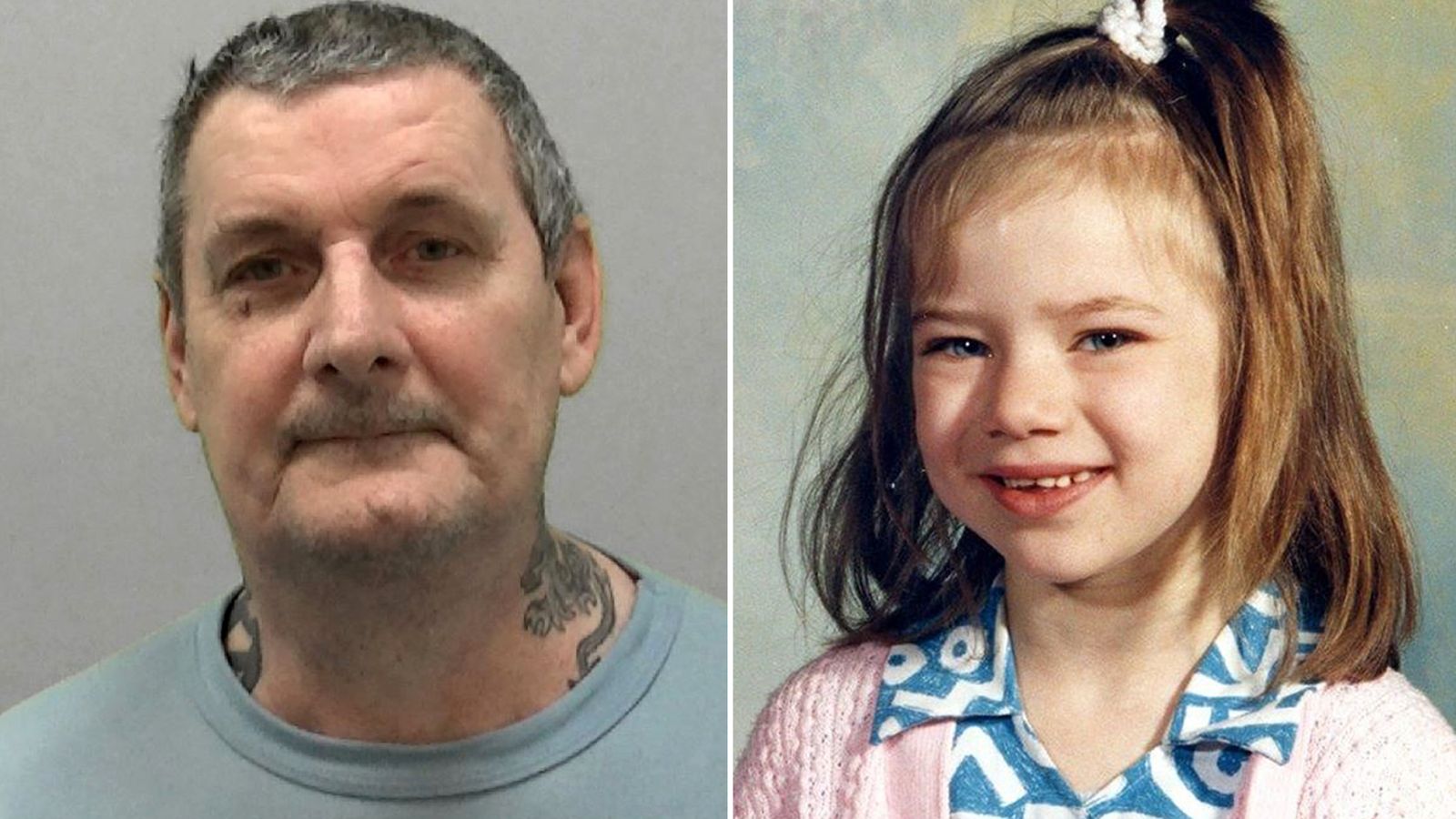A man who murdered a seven-year-old girl in Sunderland more than three decades ago has been jailed for at least 29 years.
David Boyd, 55, was convicted earlier this month of the murder of Nikki Allan in 1992.
Boyd lured the schoolgirl to a derelict warehouse in the city’s East End before beating her with a brick and stabbing her in the chest 37 times.
Nikki was either dead or dying when she was dumped in the basement of the Old Exchange building, with her shoes and coat discovered the following morning by people searching for her.
She was last seen by a witness playing outside a block of flats where she lived and skipping behind a suspect – now known to be Boyd, the boyfriend of a woman who babysat for Nikki’s family.
Speaking after the sentencing outside Newcastle Crown Court, Nikki’s mother, Sharon Henderson, who has spent 31 years campaigning for justice, slammed the sentence as a “disgrace” and “injustice”.
“I’m absolutely devastated at the sentence, absolutely devastated.”
Boyd should have been handed a whole life term with no prospect of parole, she told journalists – adding that she was still angry with the police, because “they haven’t done their jobs properly”.
“I thought I had been through trauma when I found out Nikki was murdered, but this is just…again,” she said.
Passing sentence, the judge, Mrs Justice Lambert, told Boyd: “You decided to kill her to silence her and to prevent her from telling anyone that you had sexually assaulted her or had attempted to do so.
“You hoisted Nikki up the six or seven feet necessary to reach the window and pushed her through a gap in the boarding into the derelict old Exchange building.
“Inside the building was pitch black.
“Once inside, Nikki must have been petrified.
“It would not have taken the seven-year-old long to appreciate that she was trapped in that cold and dark building and that you were coming through the window to get her.
“Her fear as she saw you lurching towards her in the dark is unimaginable.”
The court also heard victim impact statements from Nikki’s family, including Ms Henderson, described who Nikki as a “bright and sparky child who was always a mammy’s girl” and who had a “beautiful smile”.
Please use Chrome browser for a more accessible video player
‘Our lives have never been the same’
Ms Henderson’s statement, read to the court by prosecutor Richard Wright KC, said: “I cannot put into words how I felt when I heard Nikki was missing and was ultimately found murdered.”
She added: “I’m 57 and I’ve spent more than 30 years fighting for justice.
“My life and that of my family has never been the same since Nikki was murdered.
“By murdering Nikki, David Boyd destroyed the life of my beautiful daughter, my life and the lives of my daughters and grandchildren.
Please use Chrome browser for a more accessible video player
“We have not been able to live normal lives since that day.”
Police prosecuted an innocent suspect, George Heron, for murder in 1993 but he was acquitted on the orders of a judge.
Ms Henderson revealed the “horror” of the trial and how she believed Mr Heron had “got away with Nikki’s murder”.
She said she was accused of being a “bad mother” after the acquittal and felt people were angry with her rather than Nikki’s killer.
The hunt to find the person responsible had a huge impact on her physical and mental health, leading her to be hospitalised and sectioned.
Be the first to get Breaking News
Install the Sky News app for free
She was also arrested after challenging people she believed could have been covering for others in her pursuit of information, the court heard.
“I’ve felt so frustrated over the years because I felt I had not been listened to,” Ms Henderson said.
“I speak to Nikki all the time and tell her I will never give up.”
Accused suspect struggled to rebuild his life
Mr Heron had to leave Sunderland to begin a new life, despite being found not guilty.
He was subjected to oppressive questioning during three days of interviews, when he denied having any involvement in the murder 120 times – before making some kind of confession.
In a statement read to the court, he said he lost “what little honour and property I had” as a result of the false allegation.
“Moving around several times and trying to rebuild what is left of my life hasn’t been easy – learning to trust anyone is difficult and I haven’t even felt that I could trust any professional to get help.
“I have had to learn how to adapt on my own.”
Northumbria Police apologised to Mr Heron following Boyd’s conviction.
The force also issued formal apologies to Nikki’s family for the length of time it took to bring Boyd to justice and acknowledged mistakes had been made during the investigation.
Please use Chrome browser for a more accessible video player
Ms Henderson is now demanding that Northumbria Police are held accountable “for the historic failures that allowed a 31-year wait until the right man was convicted of Nikki’s murder”.
Family solicitor, Harriet Wistrich, said they are preparing to lodge a complaint with police watchdog, the Independent Office for Police Conduct (IOPC) and will explore a claim for civil damages against the force for failures “stemming from a flawed and corrupt initial investigation into Nikki’s murder.”
While Boyd remained at large, he indecently assaulted a nine-year-old girl at a park in Teesside in 1999.
He later confessed to his probation officer that he had previously had sexual fantasies about naked “young girls”.
Ms Henderson refused to give up hope her daughter’s killer would be apprehended and eventually got the backing from Northumbria Police’s then chief constable for a fresh inquiry in 2017.
Please use Chrome browser for a more accessible video player
New DNA techniques extracted traces of Nikki’s clothing in a breakthrough which ultimately led police to Boyd.
However, more than 800 men in Sunderland volunteered to give DNA samples so they could be eliminated from the inquiry.
Boyd, who was 25 at the time of the killing, denied murder. He refused to go into the witness box to give evidence.
In mitigation, the court heard Boyd has a very low IQ which is in the bottom 2% of the population.
However Mrs Justice Lambert said: “Any intellectual difficulties you face do not affect your culpability for this offence.
“You demonstrated quite sufficient guile to lure Nikki away and you were quick to attempt to cover your tracks inventing a false alibi which you gave to police.”






















